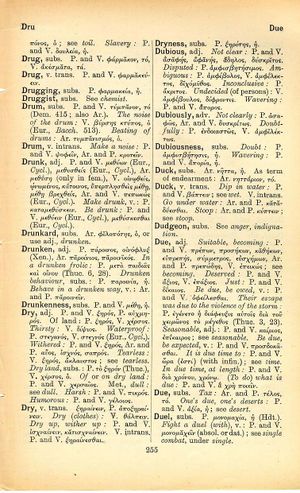dry: Difference between revisions
From LSJ
Ῥᾷον φέρειν δεῖ τὰς παρεστώσας τύχας → Facilius ferre oportet, quae incidunt mala → Recht leicht musst du das Schicksal tragen, das dich trifft
(CSV4) |
mNo edit summary |
||
| Line 12: | Line 12: | ||
<b class="b2">Harsh</b>: P. and V. [[πικρός]]. | <b class="b2">Harsh</b>: P. and V. [[πικρός]]. | ||
<b class="b2">Humorous</b>: P. and V. [[γέλοιος]]. | <b class="b2">Humorous</b>: P. and V. [[γέλοιος]]. | ||
'''v. trans.''' | '''v. trans.''' | ||
ξηραίνειν, P. ἀποξηραίνειν. | ξηραίνειν, P. ἀποξηραίνειν. | ||
<b class="b2">Dry</b> (<b class="b2">clothes</b>): V. θάλπειν. | <b class="b2">Dry</b> (<b class="b2">clothes</b>): V. θάλπειν. | ||
Revision as of 11:54, 12 August 2017
English > Greek (Woodhouse)
adj.
P. and V. ξηρός, P. αὐχμηρός. Of land; P. ξηρός, V. χέρσος. Thirsly: V. δίψιος. Waterproof: P. στεγανός, V. στεγνός (Eur., Cycl.). Withered: P. and V. ξηρός, Ar. and P. αὖος, ἰσχνός, σαπρός. Tearless: V. ξηρός, ἄκλαυστος; see tearless. Dry land, subs.: P. τὸ ξηρόν (Thuc.), V. χέρσος, ὁ. Of or on dry land: P. and V. χερσαῖος. Met., dull: see dull. Harsh: P. and V. πικρός. Humorous: P. and V. γέλοιος.
v. trans.
ξηραίνειν, P. ἀποξηραίνειν. Dry (clothes): V. θάλπειν. Dry up, wither up: P. and V. ἰσχναίνειν, κατισχναίνειν. V. intrans. P. and V. ξηραίνεσθαι.

